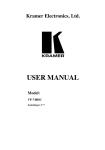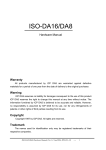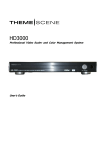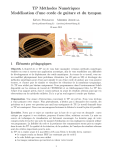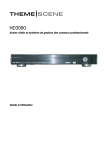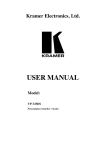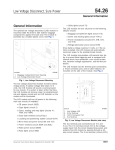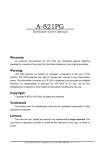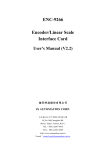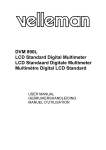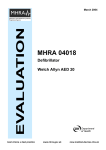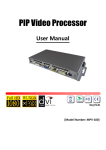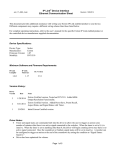Download USER MANUAL - Kramer Electronics Japan Homepage
Transcript
Kramer Electronics, Ltd. USER MANUAL Model: VP-740 Presentation Scaler / Switcher Contents Contents 1 2 3 4 5 6 6.1 7 7.1 7.2 7.3 7.4 7.5 8 8.1 Introduction Getting Started Overview Your VP-740 Presentation Scaler / Switcher Installing the VP-740 Industrial Version on a Rack Connecting the VP-740 Presentation Scaler / Switcher Connecting a PC Understanding the PIP Feature Activating the PIP Feature PIP Characteristics Resizing the PIP Moving the Position of the PIP Locking and Unlocking the Front Panel Operating the VP-740 via the OSD MENU Screen The Image Tuning Menu Screen 1 1 2 3 7 8 10 11 11 12 12 12 13 14 15 8.1.1 8.1.2 The Gamma / Color Screen The Gray Correction Screen and Auto Gain 8.2 8.3 8.4 Controlling the Geometry Selecting the Source Configuring via the Utility Screens 17 20 21 8.4.1 8.4.2 8.4.3 8.4.4 8.4.5 8.4.6 8.4.7 8.4.8 8.4.9 Choosing the Video Setting Utility Choosing the PC Data Utility Choosing the PIP Settings Utility Choosing the Seamless Switch Utility Choosing the OSD Setting Utility Choosing the Output Setting Utility Verifying Configuration Details via the Information Screen Choosing Factory Reset Choosing Advanced 21 23 24 26 26 27 29 29 30 8.5 8.6 9 10 Saving and Loading Operating via the Infra-red Remote Control Transmitter Technical Specifications VP-740 Communication Protocol 32 34 35 39 16 17 i Contents Figures Figure 1: VP-740 Presentation Scaler / Switcher Industrial Version Figure 2: VP-740 Presentation Scaler / Switcher Home Version Figure 3: Connecting the VP-740 Rear Panel Figure 4: Connecting the PC Figure 5: OSD PIP Status Figure 6: Locking / Unlocking the Front Panel Figure 7: OSD Screen Icons Figure 8: First OSD Screen: the “Image Tuning” Menu Screen Figure 9: Gamma / Color Screen Figure 10: Color Manager Screen Figure 11: Gray Correction Screen Figure 12: Geometry Screen Figure 13: Geometry – Zoom Setting Screen Figure 14: Geometry – Zoom Ratio Screen Figure 15: Geometry Aspect Ratio Screen Figure 16: Geometry Aspect Ratio Letterbox Pan Screen Figure 17: Geometry Aspect Ratio Native Screen Figure 18: Geometry Aspect Ratio 4:3 Output Shift Screen Figure 19: Geometry Aspect Ratio User Define Screen Figure 20: Source Selection Screen Figure 21: Video Setting Utility Screen (Composite or s-Video Source) Figure 22: Video Setting Utility Screen Figure 23: Video Standard Video Setting Utility Screen Figure 24: PC Data Utility Screen (Component, VGA, DVI or HDTV Source) Figure 25: PC Data Utility Screen Figure 26: PC Data Utility Color Formats Screen Figure 27: PIP Setting Utility On/Off Screen Figure 28: PIP Source Setting Utility Screen Figure 29: PIP Size Setting Utility Screen Figure 30: Seamless Switch Utility Screen Figure 31: OSD Setting Utility Figure 32: Output Setting Resolution Utility Screen Figure 33: OSD Output Status Figure 34: Output Setting Refresh Rate Utility Screen Figure 35: Output Setting User Mode Setting Utility Screen Figure 36: Information Screen Figure 37: Factory Reset Screen Figure 38: Advanced Screen Figure 39: Advanced Screen – Lock Options Figure 40: Advanced Screen –Mode Define Figure 41: Save and Load Screen Figure 42: Save Screen Figure 43: Load Screen Figure 44: Remote Transmitter ii 4 5 9 10 12 13 14 15 16 16 17 17 18 18 19 19 19 20 20 21 21 22 22 23 23 24 24 25 25 26 26 27 27 28 28 29 29 30 30 31 32 32 33 34 KRAMER: SIMPLE CREATIVE TECHNOLOGY Contents Tables Table 1: Front Panel VP-740 Presentation Scaler / Switcher Features Table 2: Rear Panel VP-740 Presentation Scaler / Switcher Features Table 3: User Mode Setting Definitions Table 4: Mode Define Features Table 5: VP-740 Remote Transmitter Functions Table 6: Technical Specifications of the VP-740 Table 7: Technical Specifications of the VP-740 (Input Signal – VGA) Table 8: Technical Specifications of the VP-740 (Input Signal – DVI) Table 9: Technical Specifications of the VP-740 (Input Signal – HDTV) Table 10: Technical Specifications of the VP-740 (Output Signal – RGB / DVI Mode) Table 11: RS-232 Protocol 5 6 28 31 34 35 36 37 37 38 39 iii Introduction 1 Introduction Welcome to Kramer Electronics (since 1981): a world of unique, creative and affordable solutions to the infinite range of problems that confront the video, audio and presentation professional on a daily basis. In recent years, we have redesigned and upgraded most of our line, making the best even better! Our 500-plus different models now appear in 8 Groups1, which are clearly defined by function. Congratulations on purchasing your Kramer VP-740 Presentation Scaler / Switcher, which is ideal for the following typical applications: Home cinema central visual switcher Presentation Educational, industrial, points of sale, churches and other large audience applications The package includes the following items: VP-740 Presentation Scaler / Switcher Power cord2, Null-modem adapter and infra-red remote control transmitter This user manual3 2 Getting Started We recommend that you: Unpack the equipment carefully and save the original box and packaging materials for possible future shipment Review the contents of this user manual Use Kramer high performance high resolution cables4 1 GROUP 1: Distribution Amplifiers; GROUP 2: Video and Audio Switchers, Matrix Switchers and Controllers; GROUP 3: Video, Audio, VGA/XGA Processors; GROUP 4: Interfaces and Sync Processors; GROUP 5: Twisted Pair Interfaces; GROUP 6: Accessories and Rack Adapters; GROUP 7: Scan Converters and Scalers; and GROUP 8: Cables and Connectors 2 We recommend that you use only the power cord that is supplied with this machine 3 Download up-to-date Kramer user manuals from the Internet at this URL: http://www.kramerelectronics.com 4 The complete list of Kramer cables is on our Web site at http://www.kramerelectronics.com 1 Overview 3 Overview The VP-740 Presentation Scaler / Switcher is a high quality graphics and video scaler, scaling any input format and resolution to a user-defined output resolution. In particular, the VP-740 Presentation Scaler / Switcher: Switches between the sources using FTB™ (Fade-Thru-Black) technology, outputting an extremely high quality image even from a low quality source Features 2xCV, 2xY/C, 2xYUV, 1xVGA, 1xDVI-D inputs, and RGBHV, Y, Pb, Pr, and DVI outputs (the DVI inputs/outputs do not support HDCP1) Supports all popular graphics and HDTV output resolutions: 480p (720x483), 576p (720x576), 720p (1280x720), and 1080i (1920x540) With its aspect ratio and film-related enhancements, is the perfect companion to any Home Cinema set up With the unique Kramer K-IIT™ (image insertion technology), provides a picture-in-picture facility for graphics-into-video and vice versa, as well as video-into-progressive scan component and vice versa Uses a universal power supply2 – 100-240 VAC with automatic voltage selection Includes a rear panel 12VDC OUT power connector that can supply 500mA to any machine with a 12VDC power input Can output to these resolutions: VGA (640x480), SVGA (800x600), XGA (1024x768), SXGA (1280x1024), UXGA (1600x1200), 720x483, 1280x720, 1920x1080i, 852x480, 1366x768, 1365x1024, 1400x1050, 480p, 576p, 720p, 1080i or User Define3 In addition, the VP-740: Incorporates a unique graphics-scaling engine with image enhancement algorithms, which are built into the firmware Is specifically designed to improve video quality by reducing chroma noise Digitally reprocesses the signal to correct mastering errors, and regenerates the video at a chosen line and pixel rate format, providing, for example, native-resolution video for LCD, DLP and Plasma displays 1 High-Bandwidth Digital Content Protection 2 We recommend that you use only the power cord that is supplied with this machine 3 The user definable output mode is recommended for advanced users only – non-standard settings may not be recognized by the display device 2 KRAMER: SIMPLE CREATIVE TECHNOLOGY Your VP-740 Presentation Scaler / Switcher Includes a built-in Picture-in-Picture inserter, letting you insert a video source into a graphics background or vice versa, allowing the user to size and position the shrunken inserted image anywhere on the screen Includes an OSD (on-screen display) that superimposes a menu on the screen for making the adjustments. The OSD itself can be adjusted—the OSD size and position, the time out, and whether the OSD status label is displayed Includes a front panel SOURCE button that scans the inputs until it locates an active source Includes a front panel lock that can be programmed via the OSD menu1 Offers high quality de-interlacing 3:2/2:2 pull down2 Can provide non-linear scaling for 4:3, 16:9 transformation Supports firmware upgrade via RS-232 Includes non-volatile memory that retains the last setting, after switching the power off Includes a front panel LCD Control the VP-740: From the front panel OSD control buttons Remotely, from the infra-red remote control transmitter Remotely, via RS-232 To achieve the best performance: Connect only good quality connection cables, thus avoiding interference, deterioration in signal quality due to poor matching, and elevated noiselevels (often associated with low quality cables) Avoid interference from neighboring electrical appliances and position your Kramer VP-740 away from moisture, excessive sunlight and dust 4 Your VP-740 Presentation Scaler / Switcher The VP-740 Presentation Scaler / Switcher comes in two versions—an industrial version (illustrated in Figure 1) and an elegant home version (illustrated in Figure 2)—both are defined in Table 1 and Table 2. 1 See section 8.4.9 2 Accommodates the frame-rate of a converted movie (24 frames per second) to video frequencies (25 frames per second (PAL); 30 frames per second (NTSC) 3 Your VP-740 Presentation Scaler / Switcher IR Hs Vs Hs Vs Comp 1 Comp 2 Hs INPUTS DVI OUTPUTS CV 2 100-240 VAC 50/60 Hz CV 1 RS-232 VGA 12 VDC OUT + DVI Vs Comp 1 Comp 2 Hs Vs YC 2 YC 1 Figure 1: VP-740 Presentation Scaler / Switcher Industrial Version 4 KRAMER: SIMPLE CREATIVE TECHNOLOGY Your VP-740 Presentation Scaler / Switcher Figure 2: VP-740 Presentation Scaler / Switcher Home Version Table 1: Front Panel VP-740 Presentation Scaler / Switcher Features # 1 2 3 4 Feature POWER Switch STATUS Display IR Receiver / LED MENU Button Industrial 6 7 8 9 10 Home Decreases the range by one step in the OSD screen Scroll Buttons on Version: 5 Function Illuminated switch supplying power to the unit Displays the status (see section 8) Red when the unit will accept IR remote commands Displays the OSD Menu screen1 and locks/unlocks the front panel ENTER Button SOURCE Button Moves up one step (in the same level) in the OSD screen Moves down one step (in the same level) in the OSD screen Increases the range by one step in the OSD screen Moves to the next level in the OSD screen Scans the inputs until it locates an active source(s)2 1 Or moves to the previous level in the OSD screen 2 AV-1, AV-2, YC-1, YC-2, Comp 1, Comp 2, VGA, or DVI 5 Your VP-740 Presentation Scaler / Switcher # 11 12 13 14 15 OUTPUTS Table 2: Rear Panel VP-740 Presentation Scaler / Switcher Features 16 Feature R/Pr BNC Connector G/Y BNC Connector B/Pb BNC Connector 2 Hs BNC Connector 2 Vs BNC Connector Connect to the RGBHV acceptor (or the component video acceptor1) DVI Connector3 Connects to the DVI4 graphics acceptor 3 Function 4 17 DVI INPUTS Connector Connects to the DVI graphics source 18 VGA INPUTS HD15 Connector Connects to the VGA (analog interface) graphics source Y/R RCA Connector Connects to the RGBHV source 1 or component video source 1 20 PB/CB/G RCA Connector Connects to the RGBHV source 1 or component video source 1 PR/CR/B RCA Connector Hs RCA Connector Connects to the RGBHV source 1 or component video source 1 Connects to the RGBHV source 1 23 Vs RCA Connector Connects to the RGBHV source 1 24 Y/R RCA Connector Connects to the RGBHV source 2 or component video source 2 25 PB/CB/G RCA Connector Connects to the RGBHV source 2 or component video source 2 PR/CR/B RCA Connector Connects to the RGBHV source 2 or component video source 2 Hs RCA Connector Vs RCA Connector Connects to the RGBHV source 2 Connects to the RGBHV source 2 26 27 28 Comp 2 INPUTS 21 22 Comp 1 INPUTS 19 29 YC 2 INPUTS 4p Connector Connects to the s-Video source 1 30 YC 1 INPUTS 4p Connector Connects to the s-Video source 2 31 CV 2 INPUTS RCA Connector Connects to the composite video source 1 32 CV 1 INPUTS RCA Connector Connects to the composite video source 2 33 RS-232 DB 9 Connector 34 12V DC OUT 35 Power Connector with FUSE Connects to PC or Serial Controller +12V DC connector for powering another unit AC connector enabling power supply to the unit 1 Via the R/Pr, G/Y and B/Pb connectors 2 For RGBS applications, one of the sync channels (Horizontal or Vertical) may be used for the S channel 3 Not HDCP compliant 4 Note that only the digital signal (DVI-D) is available on the DVI (digital video interface) connector 6 KRAMER: SIMPLE CREATIVE TECHNOLOGY Installing the VP-740 Industrial Version on a Rack 5 Installing the VP-740 Industrial Version on a Rack This section describes what to do before installing on a rack and how to rack mount. Before Installing on a Rack Before installing on a rack, be sure that the environment is within the recommended range: Operating temperature range +5 to +45 Deg. Centigrade Operating humidity range 5 to 65 % RHL, non-condensing Storage temperature range -20 to +70 Deg. Centigrade Storage humidity range 5 to 95% RHL, non-condensing How to Rack Mount To rack-mount the machine: 1 Attach both ear brackets to the machine. To do so, remove the screws from each side of the machine (3 on each side), and replace those screws through the ear brackets. CAUTION!! When installing on a 19" rack, avoid hazards by taking care that: 1 It is located within the recommended environmental conditions, as the operating ambient temperature of a closed or multi unit rack assembly may exceed the room ambient temperature. 2 Once rack mounted, enough air will still flow around the machine. 3 The machine is placed straight in the correct horizontal position. 4 You do not overload the circuit(s). When connecting the machine to the supply circuit, overloading the circuits might have a detrimental effect on overcurrent protection and supply wiring. Refer to the appropriate nameplate ratings for information. For example, for fuse replacement, see the value printed on the product label. 5 The machine is earthed (grounded) in a reliable way and is connected only to an electricity socket with grounding. Pay particular attention to supply connections other than direct connections to the branch circuit (for example, the use of power strips), and that you use only the power cord that is supplied with the machine. 2 Place the ears of the machine against the rack rails, and insert the proper screws (not provided) through each of the four holes in the rack ears. Note that: In some models, the front panel may feature built-in rack ears Detachable rack ears can be removed for desktop use Always mount the machine in the rack before you attach any cables or connect the machine to the power If you are using a Kramer rack adapter kit (for a machine that is not 19"), see the Rack Adapters user manual for installation instructions (you can download it at: http://www.kramerelectronics.com) 7 Connecting the VP-740 Presentation Scaler / Switcher 6 Connecting the VP-740 Presentation Scaler / Switcher Using the VP-740 you can select any one of the 8 inputs and scale that input to the output at the desired resolution. To connect the VP-740, as the example in Figure 3 illustrates, do the following1: 1. Connect two composite video sources (for example, composite video player 1 and composite video player 2), to the CV 1 and CV 2 INPUT RCA connectors respectively. 2. Connect two s-Video sources (for example, s-Video player 1 and s-Video player 2), to the YC 1 and YC 2 INPUT 4p connectors respectively. 3. Connect an RGB or component video2 source to the three Comp 2 INPUT RCA connectors3 Y/R, PB/CB/G, and PR/CR/B. For example: An RGB camera to Y/R, PB/CB/G, PR/CR/B OR A component video player to Y/R, PB/CB/G, PR/CR/B 4. Connect a computer graphics source to the VGA INPUT HD15 connector. 5. Connect a DVI (digital video interface) graphics source, to the DVI INPUT connector (not HDCP compliant). 6. Connect the five BNC OUTPUT connectors: R/Pr, G/Y, B/Pb, Hs, and Vs, to a video acceptor (for example, a plasma display). 7. Connect the DVI OUTPUT connector (not HDCP compliant) to a video acceptor (for example, a projector). 8. Connect the power cord4 (not illustrated in Figure 3). 9. Connect a DC power plug (optional) from another Kramer unit5 (that requires a 12VDC power input) to the 12VDC OUT connector. 10. Connect a PC (optional), as section 6.1 describes. 1 Switch OFF the power on each device before connecting it to your VP-740. After connecting your VP-740, switch on its power and then switch on the power on each device 2 Y/R, Pb/Cb/G, Pr/Cr/B is also known as Y, B-Y, R-Y, or YUV or Y, Pb, Pr 3 The Comp 1 and the Comp 2 INPUTS RCA connectors are interchangeable. You can connect two RGBHV sources, an RGBHV source to Comp 2 as well as to Comp 1; or two component (or RGB) sources, to Comp 1 as well as to Comp 2 4 We recommend that you use only the power cord that is supplied with this machine 5 For example, the Kramer FC-15 8 KRAMER: SIMPLE CREATIVE TECHNOLOGY Connecting the VP-740 Presentation Scaler / Switcher Projector Plasma Display Computer Graphics Source DVI Graphics Source RS-232 Camera (RGB) Source Figure 3: Connecting the VP-740 Rear Panel 9 Connecting the VP-740 Presentation Scaler / Switcher 6.1 Connecting a PC You can connect a PC (or other controller) to the VP-740 via the RS-232 port for remote control, and for upgrading the firmware. To connect a PC to a VP-740 unit, using the Null-modem adapter provided with the machine (recommended): Connect the RS-232 DB9 rear panel port on the VP-740 unit to the Null-modem adapter and connect the Null-modem adapter with a 9-wire flat cable to the RS-232 DB9 port on your PC To connect a PC to a VP-740 unit, without using a Null-modem adapter: Connect the RS-232 DB9 port on your PC to the RS-232 DB9 rear panel port on the VP-740 unit, forming a cross-connection1, as Figure 4 illustrates DB9 (FromPC) DB9 (To Presentation Scaler / Switcher) Figure 4: Connecting the PC 1 Also known as a Null-modem connection 10 KRAMER: SIMPLE CREATIVE TECHNOLOGY Understanding the PIP Feature 7 Understanding the PIP Feature The Picture-in-Picture inserter (PIP) is used for the simultaneous display of video and graphic sources, and lets you display: An inserted video source1 PIP over a graphic source2 An inserted graphic source2 PIP over a video source1 Your Presentation Scaler / Switcher automatically recognizes and displays only the relevant sources, as the following two examples illustrate: Choosing the AV 1 PIP source when the VGA input is selected, will insert the composite video source over the VGA graphic displayed on the screen. You can choose a component, YC 1, YC 2 or AV 2 PIP source3 (instead of the AV 1). You cannot choose VGA or DVI4 Choosing the VGA PIP source when the AV 1 input is selected, will insert the VGA graphic source over the composite video displayed on the screen. You can choose a VGA or DVI PIP source3 (instead of the VGA). You cannot choose AV 2, YC 1, or YC 25 7.1 Activating the PIP Feature To turn ON the PIP, do one of the following: Switch on the PIP functionality via the OSD Menu (see Figure 27) Press the PIP key on the remote control transmitter (see Figure 44) When the Label is ON6 (see Figure 31), the PIP is enclosed by an orange frame, and the OSD PIP status appears superimposed over the top right corner of the screen for a few seconds, as Figure 5 illustrates. After a few seconds7, the orange frame and the OSD PIP status automatically disappear8. Activating the PIP subsequently cycles between the PIP with the orange frame and no PIP. 1 That is, composite, s-Video or component video (interlaced) 2 That is, DVI, VGA or progressive component video 3 As long as it is connected and switched on. Otherwise, choosing it will display a blank screen 4 As these are graphics sources and you cannot insert a graphics PIP over a graphics source 5 As these are video sources and you cannot insert a video PIP over a video source 6 The information prompt will appear while you change the source or adjust the image. For example, you can resize the PIP via the infra-red remote control transmitter (see section 7.3) 7 By default, 20 seconds. But you can reset the timeout (from 3 to 60 seconds) 8 Trying to activate the PIP again while the PIP is still enclosed by an orange frame deactivates the PIP 11 Understanding the PIP Feature Figure 5: OSD PIP Status 7.2 PIP Characteristics You can determine the following PIP characteristics: PIP Source PIP Size (1/4, 1/9, 1/16, 1/25, Split or User Define) Horizontal and Vertical position, placing it anywhere on the screen 7.3 Resizing the PIP To resize the PIP (1/4, 1/9, 1/16, 1/25, Split or User Define): When the Label is ON and the PIP is enclosed by an orange frame, press the Up and/or Down DIRECTION keys on the infra-red remote control transmitter or the UP and/or DOWN front panel scroll buttons Use the OSD Menu buttons 7.4 Moving the Position of the PIP To move the location of the PIP: When the the orange frame and the OSD PIP status automatically disappear 1, press the Up, Down, Left and/or Right DIRECTION keys on the infra-red remote control transmitter or the UP, DOWN, LEFT and/or RIGHT front panel scroll buttons Adjust2 the H-Position and/or V-Position in the PIP Utility Settings OSD Menu (see section 8.4.3), using the remote control transmitter or the front panel OSD buttons 1 Label and frame disappear according to the Time Out Setting in the utilities Menu (see section 8.4.5) 2 Adjustment range is between –32 and +32 (default is –31) 12 KRAMER: SIMPLE CREATIVE TECHNOLOGY Understanding the PIP Feature 7.5 Locking and Unlocking the Front Panel You can lock the front panel1 and control from the infra-red remote control transmitter to safeguard the settings on the VP-740. To lock the front panel completely (none of the buttons are active): Press and hold the MENU front panel OSD button or the MENU key on the infra-red remote control transmitter for a few seconds, until the Key Lock On OSD status appears superimposed over the top right corner of the screen for a few seconds2, as Figure 6 illustrates Figure 6: Locking / Unlocking the Front Panel You can also: Lock the front panel, but keep the SOURCE button on the front panel and the source selection buttons on the IR control transmitter active while the remaining machine functions are locked (see section 8.4.9) Keep the machine locked3 after cycling the power (see section 8.4.9) To unlock the front panel (releasing the protection mechanism): Press and hold the MENU front panel OSD button or the MENU key on the infra-red remote control transmitter for a few seconds, until the Key Lock Off OSD status appears superimposed over the top right corner of the screen for a few seconds2 1 However, operation via RS-232 serial commands (remote controller or PC) is still available 2 By default, 20 seconds. But you can reset the timeout (from 3 to 60 seconds) 3 That is the front panel and the IR control transmitter remain locked 13 Operating the VP-740 via the OSD MENU Screen 8 Operating the VP-740 via the OSD MENU Screen You can control the Presentation Scaler / Switcher from the: Front panel OSD MENU and ENTER control buttons Front panel OSD Scroll buttons: Industrial Version: Home Version: Infra-red remote control transmitter MENU key and DIRECTION keys (see section 8.6) RS-232 remote control The VP-740 also includes a front panel SOURCE button that scans the inputs (AV-1, AV-2, YC-1, YC-2, Comp 1, Comp 2, VGA, and DVI) until it locates an active source. You can switch seamlessly1 between each input2 that is connected to a source, by pressing the front panel SOURCE button. The OSD status appears superimposed over the top right corner of the screen for a few seconds. Each of the five OSD screens has its distinctive icon3, which is highlighted orange when selected4 (defined in Figure 7). In addition, the appropriate setting is also displayed on the front panel STATUS display (for example, “Menu” followed by “Image Tuning” on the line below, when the Image Tuning OSD screen is selected). Image Tuning Geometry Source Selection Utility Save and Load Figure 7: OSD Screen Icons 1 For glitchless transitions between inputs 2 To set the image transition speed (fast, safe or moderate), see section 8.4.4 3 Each icon represents a Level 1 function. In addition to Level 1, the OSD structure includes Level 2 (a subset of level 1), Level 3 (a subset of level 2), Level 4 (a subset of level 3) 4 In addition the name of the selected OSD screen appears in the top left. For example, “Image Tuning” in Figure 8 14 KRAMER: SIMPLE CREATIVE TECHNOLOGY Operating the VP-740 via the OSD MENU Screen Use the OSD Menu as follows: Press the MENU front panel OSD button or the MENU key on the remote control transmitter (see Figure 44) to display the first OSD screen Press the MENU front panel OSD button or the MENU key on the infra-red remote control transmitter (see Figure 44), to move to the previous level in the OSD screen (Esc.) Press the up or down arrow buttons to select the menu icons and press ENTER to confirm the selection Use the right and left arrow buttons to increase and decrease the numerical rates (where relevant) 8.1 The Image Tuning Menu Screen The “Image Tuning” menu screen (see Figure 8) lets you adjust the brightness1, contrast1, saturation1, hue1 and sharpness2. Figure 8: First OSD Screen: the “Image Tuning” Menu Screen 1 Adjustment range is between –32 and +32 (default is 0) 2 Adjustment range is between –8 and +8 (default is 0) 15 Operating the VP-740 via the OSD MENU Screen 8.1.1 The Gamma / Color Screen Figure 9 illustrates the Gamma1 / Color Screen1. Figure 9: Gamma / Color Screen Choosing Color Manager illustrated in Figure 9, lets you adjust the red, green, blue and yellow (see Figure 10). Figure 10: Color Manager Screen 1 Adjustment range is between –10 and +10 (default is 0) 16 KRAMER: SIMPLE CREATIVE TECHNOLOGY Operating the VP-740 via the OSD MENU Screen 8.1.2 The Gray Correction Screen and Auto Gain Choosing Gray Correction1, lets you correct the gray color by adjusting the dark red, dark blue, light red, and light blue colors (see Figure 11). Figure 11: Gray Correction Screen Choosing the Auto Gain2 button lets you automatically adjust the brightness and contrast. 8.2 Controlling the Geometry Figure 12 illustrates the Geometry Screen. Figure 12: Geometry Screen 1 Adjustment range is between –32 and +32 (default is 0) 2 Available for graphics sources only 17 Operating the VP-740 via the OSD MENU Screen Figure 13: Geometry – Zoom Setting Screen You can adjust the zoom ratio to up to 400% via the OSD Menu buttons and also adjust H – Pan and V – Pan1 (see Figure 14). Figure 14: Geometry – Zoom Ratio Screen Figure 15 to Figure 19 (inclusive) illustrate the Geometry Aspect Ratio screens. Set the following characteristics according to your specific requirements: anamorphic (displays the aspect ratio (usually 16:9)), virtual wide (anamorphic plus non-linear scaling), letterbox2 (the vertical line is expanded to full screen3— it is assumed that there are two bands of black, top and bottom of the screen), native (lets you set the native resolution according to the specifications of the Plasma screen or projector), 4:3 output4 (the length to height ratio is 4:3), and user define4 (H-Zoom, V-Zoom, H-Pan, and V-Pan). 1 Adjustment range is between –64 and +64 (default is 0) 2 Adjustment range is between –32 and +32 (default is 0) 3 Panning the picture refers to resizing and cropping it 4 Adjustment range is between –32 and +32 (default is 0) 18 KRAMER: SIMPLE CREATIVE TECHNOLOGY Operating the VP-740 via the OSD MENU Screen Figure 15: Geometry Aspect Ratio Screen Figure 16: Geometry Aspect Ratio Letterbox Pan Screen Figure 17: Geometry Aspect Ratio Native Screen 19 Operating the VP-740 via the OSD MENU Screen Figure 18: Geometry Aspect Ratio 4:3 Output Shift Screen You can set the user define1 according to your specific requirements: Figure 19: Geometry Aspect Ratio User Define Screen You can adjust the Keystone1 (to keep the picture rectangular) according to your specific requirements. 8.3 Selecting the Source Figure 20 illustrates the Source Selection screen, displaying the active source, as well as facilitating changing of the source. 1 Adjustment range is between –32 and +32 (default is 0) 20 KRAMER: SIMPLE CREATIVE TECHNOLOGY Operating the VP-740 via the OSD MENU Screen Figure 20: Source Selection Screen Alternatively, you can select a source using the front panel SOURCE button (which scans the inputs until it locates an active source) or the appropriate infra-red remote control transmitter keys. 8.4 Configuring via the Utility Screens You can determine how your VP-740 will function via the Utility screen. 8.4.1 Choosing the Video Setting Utility Video Setting is automatically displayed when one of the following sources is selected: Composite1 s-Video Figure 21: Video Setting Utility Screen (Composite or s-Video Source) 1 As the information screen in Figure 36 illustrates 21 Operating the VP-740 via the OSD MENU Screen Figure 22 displays the Video Setting characteristics that include: Horizontal Start1, Vertical Start2, Noise Reduction3 and Chroma Delay4. The Video Setting menu also lets you select the Color Format (Default, RGB or YUV) and the Film Mode5. Figure 22: Video Setting Utility Screen Figure 23 displays the Video Standard Video Setting: Figure 23: Video Standard Video Setting Utility Screen 1 Adjustment range is between –15 and +15 (default is 0) 2 Adjustment range is between –19 and +19 (default is 0) 3 Adjustment range is between –16 and +16 (default is 0) 4 Adjustment range is between –4 and +3 (default is 0) 5 Select On for 3:2 or 2:2 pulldown 22 KRAMER: SIMPLE CREATIVE TECHNOLOGY Operating the VP-740 via the OSD MENU Screen 8.4.2 Choosing the PC Data Utility PC Data is automatically displayed when one of the following sources is selected: Component VGA DVI HDTV Figure 24: PC Data Utility Screen (Component, VGA, DVI or HDTV Source) Figure 25: PC Data Utility Screen Figure 26 displays the PC Data Color Formats (H-Position and V-Position have an adjustment range between –64 and +64 (default is 0)): 23 Operating the VP-740 via the OSD MENU Screen Figure 26: PC Data Utility Color Formats Screen The PC Data menu also lets you set the frequency1, Phase2, Blue Offset3 and Red Offset3. Auto image automatically sets the H-Position, V-Position, Frequency and Phase. 8.4.3 Choosing the PIP Settings Utility From the PIP Setting Utility screen, you can activate the PIP (see Figure 27), and choose the source (see Figure 28), the size (see Figure 29) and the position4 of the PIP. Figure 27: PIP Setting Utility On/Off Screen 1 Frequency has an adjustment range between –64 and +64 (default is 0) 2 Phase has an adjustment range between –16 and +16 (default is 0) 3 Adjustment range is between –32 and +32 (default is 0) 4 H-Position and V-Position have an adjustment range between –32 and +32 (default is 0) 24 KRAMER: SIMPLE CREATIVE TECHNOLOGY Operating the VP-740 via the OSD MENU Screen Figure 28: PIP Source Setting Utility Screen Figure 29: PIP Size Setting Utility Screen 25 Operating the VP-740 via the OSD MENU Screen 8.4.4 Choosing the Seamless Switch Utility From the Seamless Switch Utility screen (see Figure 30), you can choose a fast1, safe2 (takes longer than fast) or moderate (between fast and safe) image transition speed: Figure 30: Seamless Switch Utility Screen 8.4.5 Choosing the OSD Setting Utility From the OSD Setting Utility screen you can set the OSD position3, time out4, and whether the label is displayed or not. Figure 31: OSD Setting Utility 1 An immediate switch, without checking the resolution. However, the image transition may appear unstable 2 A smooth image transition (the input resolution at the input is checked and outputted after a few seconds delay) 3 H-Position and V-Position have an adjustment range between –32 and +32 (default is 0) 4 Range (in seconds) is between +3 and +60 (default is 20) 26 KRAMER: SIMPLE CREATIVE TECHNOLOGY Operating the VP-740 via the OSD MENU Screen 8.4.6 Choosing the Output Setting Utility From the Output Setting Utility screen you can adjust1 the resolution (see Figure 32) and— if the OSD status label is enabled— the OSD status appears superimposed over the top right corner of the screen2 for a few seconds3: Figure 32: Output Setting Resolution Utility Screen Figure 33: OSD Output Status From the Output Setting Utility screen you can also adjust4 the refresh rate (see Figure 34) and a user definable output mode5 (see Figure 35 and Table 3). 1 Each adjustment requires confirmation: select “ Confirm the setting” and press Enter. To cancel an adjustment, select “Discard your changes” and press Enter 2 Adjusting the output resolution results in a corresponding adjustment to the size of the OSD status window 3 By default, 20 seconds. But you can reset the timeout (from 3 to 60 seconds) 4 Each adjustment requires confirmation: select “ Confirm the setting” and press Enter. To cancel an adjustment, select “Discard your changes” and press Enter 5 Recommended for advanced users only – non-standard settings may not be recognized by the display device 27 Operating the VP-740 via the OSD MENU Screen Figure 34: Output Setting Refresh Rate Utility Screen 800 96 136 640 - 525 2 27 480 - 25.2 Figure 35: Output Setting User Mode Setting Utility Screen Table 3: User Mode Setting Definitions User Mode Setting Definitions HT: Horizontal total HW: Horizontal sync pulse width HS: Horizontal active start point HA: Horizontal active region HP: Horizontal polarity VT: Vertical total VW: Vertical sync pulse width VS: Vertical active start point VA: Vertical active region VP: Vertical polarity OCLK: Output clock Confirm: Confirm the action 28 KRAMER: SIMPLE CREATIVE TECHNOLOGY Operating the VP-740 via the OSD MENU Screen 8.4.7 Verifying Configuration Details via the Information Screen From the Information screen (see Figure 36), you can verify the main source, PIP source, output mode, as well as the firmware version number: AV-1 No Signal VGA 1280x1024 70Hz 640x480 BU 1.10 60Hz BS 1.01 Figure 36: Information Screen 8.4.8 Choosing Factory Reset From the Factory Reset Utility screen (see Figure 37), you can reset your VP-740 to its preset default setting: Figure 37: Factory Reset Screen 29 Operating the VP-740 via the OSD MENU Screen 8.4.9 Choosing Advanced From the Advanced screen, select the blank color1, choose whether the start up logo will appear on screen, and set the Mode Define2 parameters (see Figure 40). Figure 38: Advanced Screen The Advanced screen also lets you set the panel lock options (see Figure 39). Set the Save option to On to keep the panel locked the next time the machine is powered up. Set the Input lock to Off so you can still use the SOURCE button on the front panel to select an active and connected source or to select an input using your IR remote transmitter. Figure 39: Advanced Screen – Lock Options 1 The blank color is the screen color (black or blue) when there is no active source connected 2 Recommended for advanced users only – non-standard settings may not be recognized by the display device 30 KRAMER: SIMPLE CREATIVE TECHNOLOGY Operating the VP-740 via the OSD MENU Screen The Mode Define option includes the Save Mode, the Erase Mode1 and the Measure Mode (see Figure 40). When the Measure mode is set to default, it measures and displays the parameters of the currently selected input (see Figure 40 and Table 4). When the Measure Mode is set to User Define, you can set the selected input to a non-standard resolution2 and save it in the Save Mode3 (or erase it in the Erase Mode later on). 1328 272 1024 31 768 19 RGB 58.639KHz 73Hz 803 Figure 40: Advanced Screen –Mode Define Table 4 defines the Mode Define features. Table 4: Mode Define Features H Total H Start User Mode Setting Definitions Horizontal Total Horizontal active start point H Active Horizontal active region V Start Vertical active start point V Active Vertical active region Ch. Pump Charge pump current Color Color format H Freq Horizontal Frequency V Freq Vertical Frequency Measure Mode Select between Default and User Define Save Mode Save the user defined Main Source resolution Erase Mode Erase the user defined Main Source resolution 1 Save or Erase Resolution and frequency 2 When choosing Factory Reset (see section 8.4.8), the non-standard resolution resets to the default resolution setting 3 The non standard resolution appears on the Information screen as the Main Source resolution 31 Operating the VP-740 via the OSD MENU Screen 8.5 Saving and Loading You can store up to three separate adjustments: Setting 1, Setting 2, and Setting 3. Each adjustment can include alterations made via the image tuning settings (Brightness, Contrast, Saturation, Hue Sharpness, Gamma / Color, and/or Gray Correction) and/or alterations made via the aspect ratio settings (Anamorphic, Virtual Wide, Letterbox, Native, 4:3 Output, and/or User Define). You can recall any adjustment by loading the appropriate setting from the Load Screen— Setting 1, Setting 2, or Setting 3— see Figure 43, or via the remote transmitter— Memory 1, Memory 2, or Memory 3— see Figure 44. Figure 41: Save and Load Screen Figure 42: Save Screen 32 KRAMER: SIMPLE CREATIVE TECHNOLOGY Operating the VP-740 via the OSD MENU Screen Figure 43: Load Screen 33 Operating the VP-740 via the OSD MENU Screen 8.6 Operating via the Infra-red Remote Control Transmitter You can control the VP-740 via the remote transmitter: Table 5: VP-740 Remote Transmitter Functions Keys INFO Function Defines the main source, PIP source, output mode, as well as the firmware version number ON/STANDBY Cycles power FREEZE Freezes the output video image VIDEO Cycles between selecting the AV1 or AV2 source S-VIDEO Cycles between selecting the YC1 or YC2 source COMPONENT Cycles between selecting the COMP.1 or COMP.2 source ASPECT Toggles between each of the following Aspect Ratios (see Figure 15 to Figure 19 inclusive): Anamorphic (displays the aspect ratio (usually 16:9)), Virtual Wide (anamorphic plus non-linear scaling), Letterbox (the vertical line is expanded to full screen—it is assumed that there are two bands of black, top and bottom of the screen), Native (lets you set the native resolution according to the specifications of the Plasma screen or projector), 4:3 Output (the width to height ratio is 4:3), User Define DVI/VGA Cycles between selecting the DVI or VGA source PIP MEMORY 1 Selects the PIP function (see section 7.1) Loads Setting 1 MEMORY 2 Loads Setting 2 MEMORY 3 Loads Setting 3 PICTURE Toggles between each of the following modes: Normal (average setting), Presentation (higher black level), Cinema (higher white balance) CONTRAST Displays the contrast adjustment window COLOR Displays the saturation adjustment window SHARP Displays the sharpness adjustment window BRIGHT Displays the brightness adjustment window DIRECTION (5 separate keys) Maneuver within an OSD screen and/or resize the PIP via the Up and Down DIRECTION keys (when the Label is ON and the PIP is enclosed by an orange frame (see section 7.1)) and/or move the PIP (when the Label is OFF and the PIP is not enclosed by an orange frame (see section 7.1)) AUTO GAIN Automatically adjusts the brightness and contrast MENU Displays the OSD Menu screen (as Figure 8 illustrates) and locks/unlocks the front panel Figure 44: Remote Transmitter 34 KRAMER: SIMPLE CREATIVE TECHNOLOGY Technical Specifications 9 Technical Specifications Table 6 includes the technical specifications1: Table 6: Technical Specifications of the VP-740 INPUTS: OUTPUTS: SIGNAL FORMAT: SCANNING FREQUENCY: FEATURES: CONTROLS: POWER SOURCE: DIMENSIONS: Weight: Accessories: 2 x CV on RCA connectors; 2 x YC 4p connectors; 2 x RGBHV/YUV on RCA connectors; 1 x VGA/UXGA on an HD15F connector; 1 x DVI-D connector (not HDCP compliant), 1 x RS-232 on DB-9 connector 1 x DVI-D connector (not HDCP compliant) ; 1 x RGBHV/YUV on BNC connectors Video: NTSC / NTSC4.43 / PAL / PAL-M / PAL-N / PAL-60, SECAM HDTV: 480i/480p, 540p, 576i/576p, 720p & 1080i as well as user defined Graphics: VGA, SVGA, XGA, SXGA, UXGA, Mac, SUN Pixel clock 170MHz Horizontal 15.63 ~ 91kHz, auto/manual select Vertical 50 ~ 100Hz, auto/manual select Display aspect ratio 16:9, 4:3, Anamorphic, Letter Box, Film-mode Detection 3:2/2:2 Pull-Down Recovery; Y/C separation 3D Y/C Comb Filter; Picture-inPicture Graphic-on-Video, Video-on-Graphic; Any size, Any location, Direct Swap; Image Parameters Factory-defined x 3 sets; User-definable x 3 sets per channel Front panel, OSD, IR remote control, RS-232 Input voltage 90 ~ 240Vac +/- 10%, 50/60 Hz; 40VA VP-740: 48.2cm x 23.6cm x 4.4cm (19" x 9.3" x 1.72") W, D, H VP-740 ScaleMagix™: 43.2cm x 27cm x 7cm (17" x 10.63" x 2.76") W, D, H. VP-740: 3.35kg. (7.4lbs.) approx. VP-740 ScaleMagix™: 4.00kg (8.8lbs.) approx. Power cord, Null-modem adapter and infra-red remote control transmitter 1 Specifications are subject to change without notice 35 Technical Specifications Table 7: Technical Specifications of the VP-740 (Input Signal – VGA) Sync Type Support RGB Signal Resolution 640x480 640x480 640x480 640x480 640x480 640x480 720x400 720x400 720x400 800x600 800x600 800x600 800x600 800x600 800x600 832x624 832x624 1024x800 1024x800 1024x768 1024x768 1024x768 1024x768 1024x768 1152x864 1152x864 1152x870 1152x870 1152x900 1152x900 1152x900 1280x960 1280x960 1280x960 1280x720 1280x720 1280x1024 1280x1024 1280x1024 1280x1024 1280x1024 1400x1050 1400x1050 1400x1050 1400x1050 1400x1050 1400x1050 1600x1200 1600x1200 1600x1200 1600x1200 1600x1200 1080I 1920x540 720P 1280x720 480P 720x483 576P 720x576 1024x576 1024x576 1024x576 RGBHV, RGBHs, RGsB (not supported) Vertical Frequency (Hz) Horizontal Frequency (KHz) 60 31.469l 67 35.0001 72 37.861l 75 37.500l 85 43.269l 70 31.469l 85 37.92 56 35.156l 60 37.879l 72 48.077 75 46.875l 85 53.674l 75 49.7001 84 70.8401 60 48.363l 70 56.476l 75 60.200l 85 68.677l 75 67.500l 75 68.700l 66 61.846l 76 71.808l 60 60.000l 85 85.938l 60 60 63.981l 75 79.976l 76 81.130l 85 91.146l 60 66.000l 70 77.000l 72 79.200l1 75 82.500l1 85 93.500l1 60 75.000l1 70 87.500l1 75 93.750l1 85 106.250l1 60 33.6701 60 45.363l 60 31.469l 50 31.256l 60 44.000l 72 58.890l 1 Quality is not optimal, as its sample frequency is over ADC Spec 36 KRAMER: SIMPLE CREATIVE TECHNOLOGY Technical Specifications Table 8: Technical Specifications of the VP-740 (Input Signal – DVI) DVI Signal 640x480 Resolution Vertical Frequency (Hz) 640x480 60 640x480 67 640x480 72 640x480 75 640x480 85 720x400 720x400 70 720x400 85 800x600 800x600 56 800x600 60 800x600 72 800x600 75 800x600 85 832x624 832x624 75 1024x800 1024x800 84 1024x768 1024x768 60 1024x768 70 1024x768 75 1024x768 85 1280x960 1280x960 60 1280x720 1280x720 60 1280x1024 1280x1024 60 720P 1280x720 60 480P 720x483 60 576P 720x576 50 1024x576 1024x576 60 1024x576 72 * DVI Chip max clock rate 110Mhz Horizontal Frequency (KHz) 31.469l 35.0001 37.861l 37.500l 43.269l 31.469l 37.92 35.156l 37.879l 48.077 46.875l 53.674l 49.7001 70.8401 48.363l 56.476l 60.200l 68.677l 60.000l 63.981l 45.363l 31.469l 31.256l 44.000l 58.890l Table 9: Technical Specifications of the VP-740 (Input Signal – HDTV) HDTV Mode (YPbPr) DVI Signal Resolution 1080I 1920x540 720P 1280x720 480P 720x483 576P 720x576 1024x576P 1024x576 1080I, 720P, 480P, 576P, 1024x576P Vertical Frequency (Hz) Horizontal Frequency (KHz) 60 33.6701 60 45.363l 60 31.469l 50 31.256l 50 31.256l 37 Technical Specifications Table 10: Technical Specifications of the VP-740 (Output Signal – RGB / DVI Mode) RGB Mode 640x480 720x400 800x600 852x480 1024x768 1280x720 1280x1024 1366x768 1400x1050 1600x1200 1080I 720P 480P 576P User Mode Resolution 640x480 640x480 640x480 720x400 720x400 800x600 800x600 800x600 852x480 1024x768 1024x768 1024x768 1280x720 1280x1024 1280x1024 1366x768 1400x1050 1600x1200 1920x540 1280x720 720x483 720x576 Vertical Frequency (Hz) Horizontal Frequency (KHz) 60 31.469l 75 37.500l 85 43.269l 70 31.469l 85 37.92 60 37.879l 75 46.875l 85 53.674l 60 60 48.363l 75 60.200l 85 68.677l 60 60 63.981l 75 79.976l 60 60 66.000l 60 75.000l 60 33.67011 60 45.363l1 60 31.469l1 50 31.256l1 H,V Timing User Adjustable 1 RGB 38 KRAMER: SIMPLE CREATIVE TECHNOLOGY VP-740 Communication Protocol 10 VP-740 Communication Protocol Set and Get command: Set Command: Y Control_Type Function Param CR Reply: Z Control_Type Function Param CRDone>CR Get Command: Y Control_Type Function Param CR Reply: Z Control_Type Function Param CR Example: 1. "Y 1 0 32 CR" -> set Contrast value as 32 "Z 1 0 32 CR>" --> command setting success 2. "Y 10 5 CR" -> get current output resolution "Z 10 5 2 CR>" --> current resolution is 1024x768 3. "Y 0 35 CR" -> Keypad/Remote controller set Menu ON/Off "Z 0 35 CR>"-->command setting success Definition: : ASCII Code 0x20 CR: Ascii Code 0xD or 0xA After set type Command setting, system will respond a string as ">" Command set type: 0: Key Set 1: ValueSlider Set 2: ValueSlider Get 3: RadioGroup Set 4: RadioGroup Set 5: TextButton Set 6: Remote Control (Hotkey) Set Table 11: RS-232 Protocol Control Param Function Type (for Set) 0 0 N/A Information 0 1 N/A Power 0 2 N/A Freeze 0 3 N/A AV 0 4 N/A YC 0 5 N/A COMP 0 6 N/A VGA_DVI Function Description Comment 39 VP-740 Communication Protocol 40 Control Param Function Type (for Set) 0 7 N/A ASPECT 0 8 N/A PIP 0 9 N/A Memory1 0 10 N/A Memory2 0 11 N/A Memory3 0 12 N/A Picture 0 13 N/A Contrast 0 14 N/A Color 0 15 N/A Sharpness 0 16 N/A Brightness 0 17 N/A Up 0 18 N/A Left 0 19 N/A Enter 0 20 N/A Right 0 21 N/A Down 0 22 N/A Menu 0 23 N/A Auto Gain 0 24 N/A Source 1: Set 2: Get 0 -32~32 Brightness 1: Set 2: Get 1 -32~32 Contrast 1: Set 2: Get 2 -32~32 Saturation 1: Set 2: Get 3 -32~32 Hue 1: Set 2: Get 4 -8~8 Sharpness 1: Set 2: Get 5 -10~10 Gamma 1: Set 2: Get 6 -32~32 Color Temp 1: Set 2: Get 7 -32~32 Red 1: Set 2: Get 8 -32~32 Green 1: Set 2: Get 9 -32~32 Blue 1: Set 2: Get 10 -32~32 Yellow 1: Set 2: Get 11 -32~32 Dark Red 1: Set 2: Get 12 -32~32 Dark Blue 1: Set 2: Get 13 -32~32 Light Red 1: Set 2: Get 14 -32~32 Light Blue Function Description Comment KRAMER: SIMPLE CREATIVE TECHNOLOGY VP-740 Communication Protocol Control Param Function Type (for Set) 1: Set 15 -64~64 2: Get Function Description Comment Zoom-H-Pan 1: Set 2: Get 16 -64~64 Zoom-V-Pan 1: Set 2: Get 17 -32~32 LetterBox-Pan 1: Set 2: Get 18 -32~32 4:3Output Shift 1: Set 2: Get 19 -32~32 User Define H-Zoom 1: Set 2: Get 20 -32~32 User Define V-Zoom 1: Set 2: Get 21 -32~32 User Define H-Pan 1: Set 2: Get 22 -32~32 User Define V-Pan 1: Set 2: Get 23 -32~32 KeyStone Angle 1: Set 2: Get 24 -127~127 PC Data: H-Position 1: Set 2: Get 25 -64~64 PC Data: V-Position 1: Set 2: Get 26 -64~64 PC Data: Frequency 1: Set 2: Get 27 -16~16 PC Data: Phase 1: Set 2: Get 28 -32~32 PC Data: Blue Offset 1: Set 2: Get 29 -32~32 PC Data: Red Offset 1: Set 2: Get 30 -15~15 Video: H-Position 1: Set 2: Get 31 NTSC: 10~10 PAL:19~19 Video: V-Position 1: Set 2: Get 32 -16~16 Video: Noise Reduction 1: Set 2: Get 33 -4~3 Video: Chroma Delay 1: Set 2: Get 34 -32~32 Video: Cb Y Cb Cr input only 1: Set 2: Get 35 -32~32 Video: Cr Y Cb Cr input only 1: Set 2: Get 36 -32~32 PIP Setting: H-Postion 1: Set 2: Get 37 -32~32 PIP Setting: V-Position 38 0~255 PIP Setting: User Define H-Size 1: Set 2: Get 41 VP-740 Communication Protocol Control Param Function Type (for Set) 1: Set 39 0~255 2: Get PIP Setting: User Define V-Size 1: Set 2: Get 40 -32~32 OSD Setting: H-Position 1: Set 2: Get 41 -32~32 OSD Setting: V-Position 1: Set 2: Get 42 3~60 OSD Setting: OSD TimeOut 3: Set 4: Get 3:Set 4:Get 1 0~10 0~4 Zoom Setting: Zoom Ratio 0: Off 1: 150% 2: 200% 3: 225% 4: 250% 5: 275% 6: 300% 7: 325% 8: 350% 9: 375% 10: 400% Aspect Ratio: Native 0:Left+Up 1:Right+UP 2:Center 3:Left+Down 4:Right+Down 3: Set 4: Get 2 0~7 Select Input Source 0: AV-1 1: AV-2 2: YC-1 3: YC-2 4: Component-1 5: Component-2 6: VGA 7: DVI 3: Set 4: Get 3 0~2 PC Data: Color Format 0: Default 1: RGB 2: YUV 3: Set 4: Get 4 0~2 Video Setting: Color Format 0: Default 1: RGB 2: YUV Video Setting: Video Standard 0: Video Standard - Auto 1: Video Standard - NTSC 2: Video Standard - NTSC 4.43 3: Video Standard - PAL 4: Video Standard - PAL-N 5: Video Standard - PAL-M 6: Video Standard - SECAM 3: Set 4: Get 3: Set 4: Get 42 0 Function Description 5 0~6 6 0~1 PIP Setting: PIP On/Off Comment 0: Off, 1: On KRAMER: SIMPLE CREATIVE TECHNOLOGY VP-740 Communication Protocol Control Param Function Type (for Set) 3: Set 4: Get 7 0~7 Function Description PIP Setting: PIP Source 0: AV-1 1: AV-2 2: YC-1 3: YC-2 4: Component-1 5: Component-2 6: VGA 7: DVI 3: Set 4: Get 8 0~5 PIP Setting: PIP Size 0: 1/25 1: 1/16 2: 1/9 3: 1/4 4: Split 5: User Define 3: Set 4: Get 9 0~2 Seamless Switch 0: Fast 1: Moderate 2: Safe 3: Set 4: Get 10 0~1 OSD Setting: Label On/Off 0:Off, 1:On 3: Set 4: Get 11 0~1 Advanced Setting: Blank Color 0: Blue 1: Black 3: Set 4: Get 12 0~1 Advanced Setting: Logo On/Off 0:Off, 1:On 3: Set 4: Get 13 0~15 Output Resolution 0: 640x480 1: 800x600 2: 1024x768 3: 1280x1024 4: 1600x1200 5: 720x483 6: 1280x720 7: 1920x1080i 8: 852x480 9: 1366x768 10: 1365x1024 11: 1400x1050 12: 480P 13: 720P 14: 1080i 15: 576P 16: User Define 3: Set 4: Get 14 0~2 Output Refresh Rate 0: 60Hz 1: 75Hz 2: 85Hz 3: 50Hz 3: Set 4: Get 15 0~1 Factory Reset 0:Cancel, 1:ok 3: Set 4: Get 16 0~1 Key Lock Save 0:Off, 1:On 3: Set 4: Get 17 0~1 Input Lock 0:Off, 1:On 0:Off, 1:On 3: Set 4: Get 18 0~1 Video Setting: Film Mode 5 0 N/A Aspect Ratio - Anamorphic 5 1 N/A Aspect Ratio Virtual Wide Comment New Mode 43 VP-740 Communication Protocol Control Param Function Type (for Set) 5 2 N/A Aspect Ratio - Letterbox 5 3 N/A Aspect Ratio - Native 5 4 N/A Aspect Ratio - 4:3 Output 5 5 N/A Aspect Ratio - User Define 5 6 N/A Load Gamma/Color - Normal 5 7 N/A Load Gamma/Color Presentation 5 8 N/A Load Gamma/Color Cinema 5 9 N/A Load Gamma/Color Setting1 5 10 N/A Load Gamma/Color Setting2 5 11 N/A Load Gamma/Color Setting3 5 12 N/A Save Gamma/Color Setting1 5 13 N/A Save Gamma/Color Setting2 5 14 N/A Save Gamma/Color Setting3 6: Set 7: Get 0 0~1 Power 0: Power Down 1: Power On 6: Set 7: Get 1 0~1 Freeze 0: Off 1: On 6: Set 7: Get 2 0~1 Key Lock 0: Off 1: On N/A "Resolution/Refresh Rate" Or "Video Stand" 8 44 Function Description 0 Comment example: "Y 8 0 CR" return: "Z 8 0 1080i CR" KRAMER: SIMPLE CREATIVE TECHNOLOGY LIMITED WARRANTY Kramer Electronics (hereafter Kramer) warrants this product free from defects in material and workmanship under the following terms. HOW LONG IS THE WARRANTY Labor and parts are warranted for seven years from the date of the first customer purchase. WHO IS PROTECTED? Only the first purchase customer may enforce this warranty. WHAT IS COVERED AND WHAT IS NOT COVERED Except as below, this warranty covers all defects in material or workmanship in this product. The following are not covered by the warranty: 1. 2. 3. Any product which is not distributed by Kramer, or which is not purchased from an authorized Kramer dealer. If you are uncertain as to whether a dealer is authorized, please contact Kramer at one of the agents listed in the web site www.kramerelectronics.com. Any product, on which the serial number has been defaced, modified or removed. Damage, deterioration or malfunction resulting from: i) Accident, misuse, abuse, neglect, fire, water, lightning or other acts of nature ii) Product modification, or failure to follow instructions supplied with the product iii) Repair or attempted repair by anyone not authorized by Kramer iv) Any shipment of the product (claims must be presented to the carrier) v) Removal or installation of the product vi) Any other cause, which does not relate to a product defect vii) Cartons, equipment enclosures, cables or accessories used in conjunction with the product WHAT WE WILL PAY FOR AND WHAT WE WILL NOT PAY FOR We will pay labor and material expenses for covered items. We will not pay for the following: 1. 2. 3. Removal or installations charges. Costs of initial technical adjustments (set-up), including adjustment of user controls or programming. These costs are the responsibility of the Kramer dealer from whom the product was purchased. Shipping charges. HOW YOU CAN GET WARRANTY SERVICE 1. 2. 3. To obtain service on you product, you must take or ship it prepaid to any authorized Kramer service center. Whenever warranty service is required, the original dated invoice (or a copy) must be presented as proof of warranty coverage, and should be included in any shipment of the product. Please also include in any mailing a contact name, company, address, and a description of the problem(s). For the name of the nearest Kramer authorized service center, consult your authorized dealer. LIMITATION OF IMPLIED WARRANTIES All implied warranties, including warranties of merchantability and fitness for a particular purpose, are limited in duration to the length of this warranty. EXCLUSION OF DAMAGES The liability of Kramer for any effective products is limited to the repair or replacement of the product at our option. Kramer shall not be liable for: 1. 2. Damage to other property caused by defects in this product, damages based upon inconvenience, loss of use of the product, loss of time, commercial loss; or: Any other damages, whether incidental, consequential or otherwise. Some countries may not allow limitations on how long an implied warranty lasts and/or do not allow the exclusion or limitation of incidental or consequential damages, so the above limitations and exclusions may not apply to you. This warranty gives you specific legal rights, and you may also have other rights, which vary from place to place. NOTE: All products returned to Kramer for service must have prior approval. This may be obtained from your dealer. This equipment has been tested to determine compliance with the requirements of: EN-50081: "Electromagnetic compatibility (EMC); generic emission standard. Part 1: Residential, commercial and light industry" EN-50082: "Electromagnetic compatibility (EMC) generic immunity standard. Part 1: Residential, commercial and light industry environment". CFR-47: FCC Rules and Regulations: Part 15: “ Radio frequency devices Subpart B – Unintentional radiators” CAUTION! Servicing the machines can only be done by an authorized Kramer technician. Any user who makes changes or modifications to the unit without the expressed approval of the manufacturer will void user authority to operate the equipment. Use the supplied DC power supply to feed power to the machine. Please use recommended interconnection cables to connect the machine to other components. 45 For the latest information on our products and a list of Kramer distributors, visit our Web site: www.kramerelectronics.com, where updates to this user manual may be found. We welcome your questions, comments and feedback. Safety Warning: Disconnect the unit from the power supply before opening/servicing. Caution Kramer Electronics, Ltd. Web site: www.kramerelectronics.com E-mail: [email protected] P/N: 2900-000740 REV 2A


















































